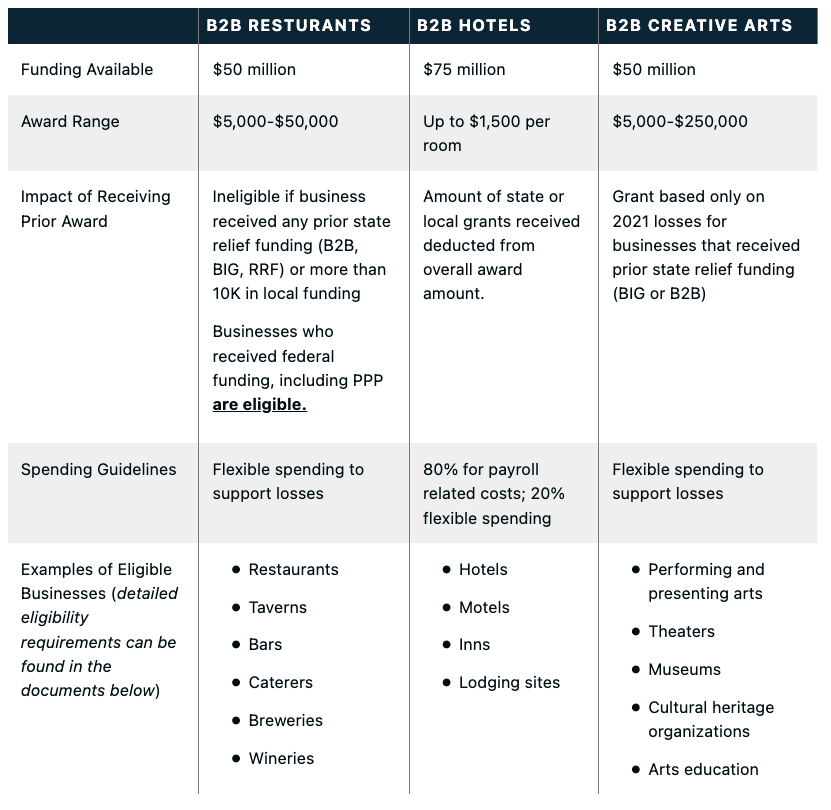Governor JB Pritzker and the Illinois Department of Commerce and Economic Opportunity (DCEO) announced $175 million in available grant funding through the Back to Business (B2B) program. Following state recovery for businesses totaling nearly $1.5 billion, the latest American Rescue Plan Act (ARPA) -funded opportunity is designed to provide additional support for the hardest-hit sectors, including restaurants (B2B Restaurants), hotels (B2B Hotels), and businesses or organizations in the creative arts sector (B2B Arts). To provide hands-on support and raise awareness about the program, the State has mobilized a network of more than 100 community navigators across Illinois.
“In the three years since COVID-19 brought our state, our nation, and our world to a standstill, Illinois businesses have come back swinging—in part thanks to our Back to Business program,” said Governor JB Pritzker. “My administration is committed to helping small business owners move past survival and onto long-term success—and this latest investment of $175 million in B2B grants does exactly that.”
As outlined in statute, B2B Arts and B2B Restaurants grant award amounts will be determined by revenue declines, as reflected on tax returns, and funding for hotels will be allocated by number of rooms. Applications are open from April 5 through May 10, 2023 and awards are expected to be made several weeks after the deadline date. All eligible applicants will receive a grant as long as the business meets eligibility requirements and submits proper documentation and attestations.
The program design is based on legislation establishing the Restaurant Employment and Stabilization Grant Program ($50 million), Hotel Jobs Recovery Grant Program ($75 million) and the Illinois Creative Recovery Grant program ($50 million). The funding is designed to offset losses and support job retention in the hardest-hit industries.
“Illinois’ businesses have made a strong recovery since the most difficult times of the pandemic and we’re proud to build upon that progress through additional support for hard-hit industries,” said DCEO Director Kristin A. Richards. “Restaurants, hotels and creative arts are industries designed to bring people together, and with an additional $175 million we are investing in communities and supporting continued economic development.”
DCEO has enlisted a robust network of more than 100 community navigators to conduct outreach and provide technical assistance in the hardest hit communities. Community Navigators will be conducting outreach, hosting webinars, and supporting prospective applicants to prepare before the application opens on April 5, 2023. This is in addition to available small business support available through Illinois’ network of Small Business Development Centers (SBDCs).
In order to manage a high volume of applications in a timely manner, DCEO has enlisted a program administrator – the National Community Reinvestment Coalition Community Development Fund (NCRC CDF) – to support with application review, provide technical portal support for applicants, manage the development of the application portal and provide support in processing payments.
“The impacts of the pandemic are far from over for small businesses and its aftermath continues to threaten their long-term success, especially for those owned by Black, Latino, and other underserved entrepreneurs,” said Marisa Calderon, Executive Director of NCRC CDF. “These grants will help to shore up small businesses, preserve what they have worked so hard to build, and save jobs in our communities.”
Eligibility, Application, and Awards
The B2B Restaurants (20 ILCS 605/605-1100), B2B Hotels (20 ILCS 605/605-1095) and B2B Arts (30 ILCS 709/40) programs were designed in accordance with state statute, which specified industries, buckets of funding, spending guidelines and more. A summary of the programs are included below.

View a recording from Choose DuPage’s informational webinar:
“Budgets are about priorities, and another $175 million for the B2B program is once again reiterating that small businesses are top of mind,” said Leader Jehan Gordon-Booth, (D-Peoria). “Small businesses are built on dreams. Whether it is a young person with a new plan, or a long-held idea for a second career, it is a priority that the State of Illinois do everything we can to help them thrive.”
“The Back to Business program and other relief efforts helped thousands of small businesses across Chicago and Illinois bounce back from the pandemic,” said State Senator Elgie?Sims, (D-Chicago). “Because Illinois has been responsible in our budgeting, we are able to provide funds for entrepreneurs and businesses that need it most.”
“Tourism businesses like restaurants, hotels, and arts organizations are the beating heart of not just my district’s local economy, but they are critical to the entire state,” said State Senator Sara Feigenholtz, (D-Chicago). “I look forward to businesses across Illinois being reinvigorated by these dollars as they gear up for what will be an incredible travel summer for our state.”
“We are excited to spread the word about the additional $175 million in available grant funding to businesses that need support,” said State Senator Celina Villanueva, (D-Chicago). “During previous rounds, I walked door to door with DCEO to make sure that small business owners, especially immigrant-owned businesses, knew about this opportunity so they can get the support that they need. I look forward to visiting my small business corridors again with this great news.”
“Chicago has seen an encouraging rise in tourism and the timing couldn’t be better for the small businesses in my district,” said State Rep. Theresa Mah, (D-Chicago). “We look forward to building upon this momentum as the state launches the next round of funding for restaurants, hotels and creative arts organizations.”
“These restaurant grants are a lifeline for local restaurants that are continuing to recover from the past few years,” said Sam Toia, President and CEO of Illinois Restaurant Association. “We are grateful to Governor Pritzker and DCEO for their partnership and ongoing support of the hospitality industry.”
“The hotel industry was among the hardest hit during the COVID-19 pandemic. As occupancy numbers rise closer to pre-pandemic levels and the industry continues to recover, the funding from this grant will give us the boost we need to rehire workers and support the returning tourism demand,” said Michael Jacobson, President & CEO of the Illinois Hotel & Lodging Association. “I want to thank Governor Pritzker and DCEO for their efforts to support Illinois’ tourism economy and show the rest of the world that we are ready to welcome visitors to our communities.”
“This $50 million in relief funding for the creative sector couldn’t come at a more critical time,” says Claire Rice, Executive Director of Arts Alliance Illinois. “We just passed the three-year anniversary of the March 2020 shutdown, and our sector is still facing significant challenges: lower revenues, audience hesitancy, and increased expenses. We’re grateful to the State of Illinois for making this recovery funding possible, and the Alliance will work tirelessly with a large partner network to make sure that our colleagues in arts and culture across Illinois know that these invaluable dollars are available to help recoup some of their losses.”
B2B Restaurants, B2B Hotels and B2B Arts builds on the success of the Business Interruption Grants (BIG) program and the first round of the Back to Business (B2B) Programs, launched by the Pritzker administration to provide more than 15,000 awards to businesses totaling $536 million, with 47 percent of grants awarded to minority-owned businesses – a testament to the work of the community navigators program designed to help reach more underserved businesses in minority and rural communities across the state.
Since the onset of the pandemic, DCEO has allocated nearly $1.5 billion in pandemic-related support for businesses, including $536 million through B2B & BIG, $899 million in Child Care Restoration Grants (administered in partnership with DHS), $18.5 million in local CURE funding specifically allocated to businesses, $14 million in Emergency Hospitality Grants, and $3.5 million in BIG agriculture grants.


